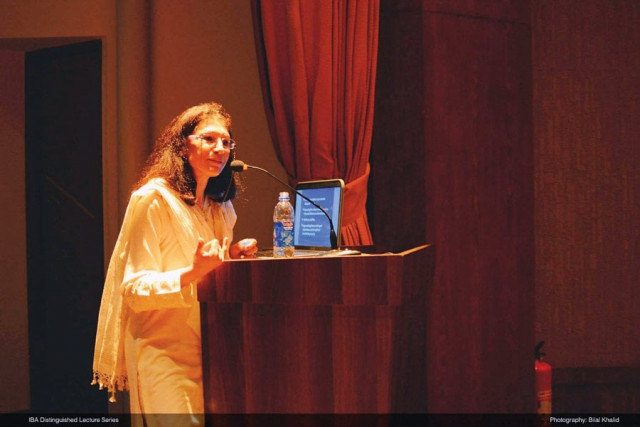Preserving Pakistan: ‘To fight terrorism, consider people partners in govt’
Relations with India, Cold War facilitated military dominance in country: Jalal

Historian Ayesha Jalal. PHOTO COURTESY: IBA SOCIAL SCIENCES CLUB
Historian Ayesha Jalal said on Saturday rooting out terrorism from the country required changing the pattern of governance to one where people were considered equal partners, rather than subjects. “Pakistan needs a post-post colonial state to fight terrorism,” she said.
She was speaking at a talk about her latest book The Struggle for Pakistan: A Muslim Homeland and Global Politics at Dabistan-i-Iqbal.
Jalal said the country had inherited its legal system from the British. “The system they had put in place in India treated common people with suspicion,” she said. She said the process of de-colonisation would remain incomplete as long as the legacies of colonialism were not done away with.
Earlier, Jalal said that studies on Pakistan had been focused mostly on personalities. “There has been no attempt at understanding the actions of these individuals in the context of global politics,” she said. “We have placed an undue burden on our leaders, either unconditionally glorifying them or completely diminishing them,” she said.
Jalal said a number of historians argued that if Muhammad Ali Jinnah had not died immediately after the partition, the situation in the country would have been different. “Mahatma Gandhi was a central figure in Indian National Congress. He also died after the partition but that did not have a huge impact on Indian politics,” she said.
She said a number of factors had contributed to the post-partition political developments in the country, including division of territory and resources between Pakistan and India. She mentioned the decision to divide the Punjab between the two countries as crucial. She said the distribution of resources between Pakistan and India was not equitable. She said these factors had impacted the country’s decisions to ally itself with the United States.
In discussing Zulfikar Ali Bhutto’s role in the events leading up to the secession of Bengal in 1971, Jalal said there was evidence to confirm that talks between West Pakistan administration and Awami League were sabotaged by the military establishment.
Yet, she said Bhutto had been routinely blamed for the breakdown of negotiations. She said Bhutto had wanted to hold a debate on Mujibur Rehman’s six-points. However, Rehman was not willing to discuss them, she added. “Bhutto erred in rejecting Rehman’s invitation to ally with the Awami League against the military establishment,” she said.
Jalal said military’s dominance in the country should be understood with reference to relationship with India and the Cold War between the United States and Soviet Union. She said the first military coup in the country could not be understood without reference to the Cold War. “The military establishment alone could play the role sought at that time by the US,” she said. She added that the coup had laid the foundation for an unbalanced relationship between the centre and provinces,” she added.
She said with the end of the Cold War a military dictatorship in the country was no longer feasible. She said this explained General Pervaiz Musharaf’s need to legitimise his rule through a sham-democratic process.
Discussing 2013 general elections, Jalal said elections could not have been more free and fair under the current political arrangement in the country. She noted that during election campaign right-wing political parties were given a free hand and left-leaning parties marginalised. However, she said there was no evidence of systematic rigging.
Published in The Express Tribune, June 28th, 2015.



















COMMENTS
Comments are moderated and generally will be posted if they are on-topic and not abusive.
For more information, please see our Comments FAQ